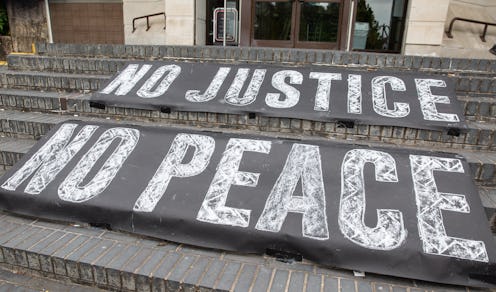Life
Experts Explain How To Emotionally Prepare For A Protest

Protesting can be fun, invigorating, and inspiring. They can also be traumatic, triggering, and physically exhausting. As protests worldwide affirm that Black Lives Matter, advice suggests you should get organized before you head out with a placard. Make sure you have water, comfortable shoes, face masks, and that you protect the personal data on your phone. But you should also be emotionally prepared for a protest.
"Joining a protest should ideally be done from a place of strength and feeling grounded," Dr. Rebecca Kuhns M.D., a psychiatrist, tells Bustle. If these protests and the issues they're fighting bring up strong emotions for you, you may feel a lot of physical tension and turmoil. Research shows that trauma is often held and expressed physically.
"No matter how hard you try to bury your trauma, it will more than likely show up in the body," Jasmine Irons Anokute, founder of Heart Centered Energy, an energy healing practice, tells Bustle. "It's so important to pay attention to the patterns within yourself. Awareness is the first step in healing trauma."
Notice what your body is doing and how it reacts to the idea of protesting. "Trauma can lay dormant in the mind and body waiting to be detonated by a triggering event," Elaisha Jade, a certified mindfulness and meditation teacher, tells Bustle. "When our sympathetic nervous system is activated by a stressful situation, our mind and body responses shift into survival mode." This can mean a heightened heart rate, sweatiness, and feelings of anxiety or panic.
Before you leave for protests, experts say it's a good idea to have a small ritual to prepare yourself body and mind. "Find time to take a moment of silence, center yourself with a grounding activity and connect to your breath," Jasmine Marie, a breathwork practitioner and founder of Black Girls Breathing, tells Bustle. "Have a ritual where you process what you experienced after and wind down. It's important to take care of yourself so that you can keep going." Dr. Kuhns suggests a technique called box breathing, where you breathe in for a count of four, hold for a count of four, and exhale for a count of four, on repeat.
If you don't know where to start, try mindfulness. "Mindful practices I recommend to support the minds and bodies of protesters are guided body scan meditations, compassion meditations, sound meditations, and breathwork," Jade says. "Each type of meditation focuses on an important aspect of healing." Find one that suits you; body scan meditation helps you pay attention to your body, compassion meditation focuses on compassion for those around you, and sound meditation and breathwork can help lower stress levels and calm you down.
Police brutality at protests can be upsetting to witness, and it's worth preparing for that. Activists in the 1960s participating in the Civil Rights Movement, Irons Anokute says, did specific training before non-violent protests to attempt to strengthen themselves mentally for future violence. Training included role-playing violent situations and how to maintain discipline when under attack. "Before protesting you have to be mentally armed as well and know yourself and how you'll react if violence ensues," she says. "You don't want to further your trauma and be triggered possibly harming yourself or others."
That said, protesting can be freeing. "There are potential traumas that folks may face at a protest — the threat of police aggression is real and present," Dr. Kuhns says. "However, I want to note that for many folks, the act of protesting can be immensely freeing and should not necessarily be expected to be inherently traumatic." A lot of people find that protesting releases major endorphins and helps them heal from trauma that, Jade says, can be intergenerational, passed down from family and ancestors. No matter how you prepare, stay safe.
Experts:
Jasmine Irons Anokute
Elaisha Jade
Dr. Rebecca Kuhns M.D.
Jasmine Marie
Studies cited:
Ma, X., Yue, Z. Q., Gong, Z. Q., Zhang, H., Duan, N. Y., Shi, Y. T., Wei, G. X., & Li, Y. F. (2017). The Effect of Diaphragmatic Breathing on Attention, Negative Affect and Stress in Healthy Adults. Frontiers in psychology, 8, 874. https://doi.org/10.3389/fpsyg.2017.00874
This article was originally published on